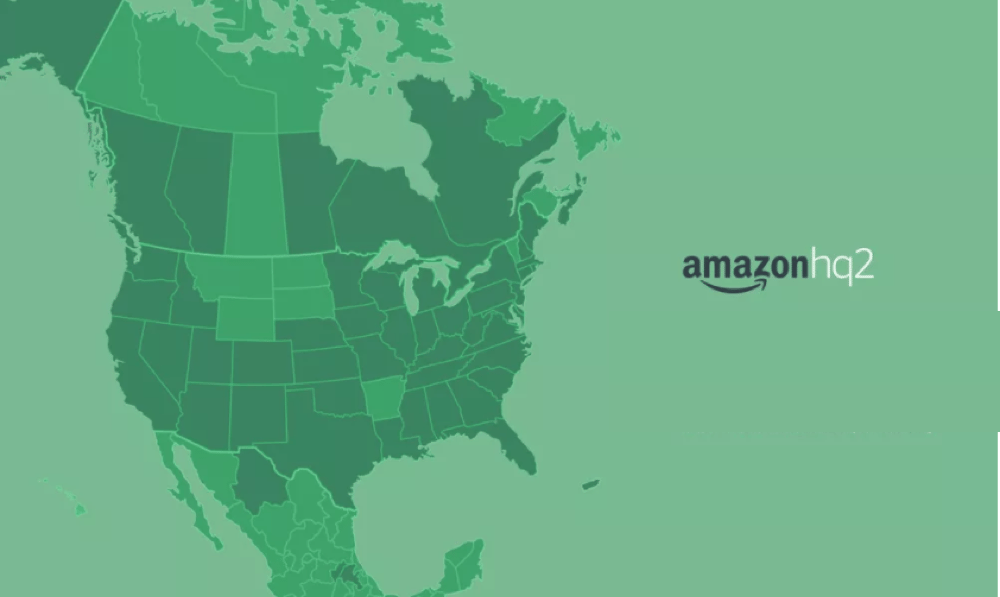It's all over. Amazon is steps away from finalizing its decision about where to to place it's new headquarters and all signs point to the fact that they are headed to the East Coast to build HQ2, which it decided to split between New York City and Arlington, Virginia.
Back in 2017, Amazon announced that would establishing a second headquarters in addition to the original in the Seattle area because it had outgrown its northwestern roots. The city that would become home to HQ2, as they dubbed it, would receive an economic boom — including 50,000 new jobs over two decades — that comes along with having one of the biggest companies in the world stationed in its backyard. These are no ordinary jobs either. According to the New York Times, those Amazon employees would earn more than $100,000 per year on average.
Naturally, cities queued up to offer enticing incentives, including large subsidies, in order to lure the retail giant into selecting their area as Amazon’s new home. The competition got pretty intense. As the New York Times reported, the New York State Governor Andrew Cuomo once said he would change his name to Amazon Cuomo if that would convince the retail giant to hunker down in the state. Colorado Governor John Hickenlooper was always less eager about bringing the corporation to the Rocky Mountains. About a month ago, in an interview with Colorado Public Radio, he appeared to waive the white flag in the bidding war.
Amazon handled these recruiting efforts as any free agent would, by touring the country and enjoying the festivities in every city as stakeholders showcased the highlights of their area and explained how their municipality would be capable of taking on Amazon’s massive presence. Amazon eventually compiled a list of 20 suitors and Denver was on that list. As Mac Clouse, a finance professor in the Daniels College of Business at the University of Denver, points out, many of the qualities Amazon said it wanted in a city described Denver pretty accurately. Clouse said this makes its apparent choice to split the headquarters between the Queens borough of New York City and Crystal City, a neighborhood right around Arlington, Virginia, especially “befuddling.”
Some of the major things Amazon said they wanted included a high quality of life, access to a talented labor pool, proximity to an airport, and ample available of workspace, according to Clouse. He said cities like Denver, Austin and Pittsburgh seem to fit that description better than the hustle and bustle, high cost of living and tight spaces of New York City.
“Cities like Denver, Austin, Texas, it makes some sense. When you get into the clutter of Queens and Manhattan and that area, and you've got a little bit of busyness in the Arlington area because of D.C., it’s not sure what the advantage is to Amazon of having a HQ there, other than just being close to D.C. if they want to talk to regulators, and close to NYC because it’s the biggest city in the country,” Clouse said.
The fact that Denver appears to have lost out on Amazon is pretty negligible, according to Clouse. He said many of the concerns expressed about Denver’s ability to handle the infrastructure demands an Amazon headquarters would have brought may have been valid. He noted that Denver is already currently struggling to handle its enormous growth and an influx of Amazon employees could have further exacerbated the problems we see in housing and traffic.
The city and state were also not willing to fork over some of the incentives other municipalities were offering in order to secure the new Amazon location, but Clouse said that’s probably a good thing in the long run.
“Bottom line: the city wanted to make sure they got some positive economic benefit from it, so you can't give all of it back to Amazon” Clouse said.
He also pointed out Denver’s recent successes in attracting headquarters from large companies. He noted that while these other companies come with tremendous economic gain, they aren’t at such a size that they fundamentally disrupt Denver's business ecosystem. Those recruits include companies like Slack and VF Corporation. While those companies are not the size of Amazon, they are in their own right very notable additions to Denver’s landscape.
“What comes out of this is that we didn't catch the big fish but we’ve been catching a lot of smaller fish that are easier to assimilate into our economy and our business sector than it would have been to land a big whale like Amazon.”
He does say that this endeavor could be beneficial for the city in the long run. He says the city is clearly learning what it takes to recruit headquarters, and having smaller companies in the city also allows them room to grow.













